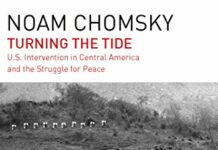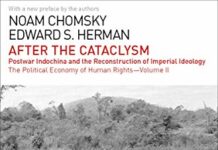
Ebook Info
- Published: 2004
- Number of pages: 336 pages
- Format: PDF
- File Size: 14.94 MB
- Authors: Noam Chomsky
Description
This book offers chapters written by Chomsky just before the 2000 Intifada and up through October 2002, when 9-11 and a prospective military campaign against Iraq add new pressures to age-old conflicts.
User’s Reviews
Editorial Reviews: Review After 9/11 everything we were selling was an analysis of the Middle East. I’ve ordered 100 copies of Chomsky’s new one, Middle East Illusions. — Edward Nawotka ― Publishers WeeklyIt’s impossible not to agree with him most of the time, and I’ve yet to find a book of his that doesn’t sell. ― The BooksellerActing as a deliberately provocative American conscience, Chomsky argues that Israel behaves like a colonial power in the Occupied Territories. His indictments of casual American hypocrisy and abuse of power are important, and his thesis that Israel’s actions, far from enhancing its security, compromise it by polarizing opinion both within Israel and beyond is reasonable. ― Sunday TimesThis is a lucid, well-documented, first-class book that should be in every library. ― Day By DayIn Middle East Illusions, Noam Chomsky proposes an alternative resolution to the conflict between Israel and Palestine and questions the territory’s strategic and economic importance to the industrial powers, most notably the United States. ― Z MagazineAn intriguing, scholarly analysis of fateful errors and lasting impacts. ― The BookwatchAnswers divisive questions about the Israeli-Arab policy and U.S. involvement in the Middle East. ― Foreword Reviews
Reviews from Amazon users which were colected at the time this book was published on the website:
⭐Overall an amazing book. Chomsky is a one-of-a-kind figure with intelligence that is off the charts (his charts I suppose for those who dislike him). I do not live on “Planet Chomsky” as his counterparts have labeled those who buy wholeheartedly into his speeches and works. Intrigued by his writings, I have been actively researching the Middle East situation and he makes many valid points that near objectivism if you allow yourself to put aside the ideology that the U.S. has instilled in its citizens over Israel. There is NO objective right or wrong in this messy conflict, but he wonderfully challenges both sides in this bitter struggle, noting that the injustices by both sides are plentiful. It is a must-read for anyone and everyone concerned. I’d like to note that this review is from a white, U.S.-born citizen raised by Republicans and in adulthood has no ties to either party. Chomsky is by no means the be-all-end-all expert, and yes, many of his opinions are wildly out there, however, I would be doing an injustice (minor in comparison to those laid out in the book) by labeling this writing as anything but insightful.
⭐Buy this book to understand the roots of the Middle East mayhem.
⭐Noam Chomsky’s Middle East Illusions is a collection of works from both the Cold War era and post-Cold War era. The combination of these works allows the reader to experience the development of events and the feelings of diplomatic hostility and distrust between the Western super powers and the nationalist movements throughout Middle East. The events and people throughout Middle East Illusions jump around several times, which is typical of Chomsky’s works. One should have some background knowledge of United States foreign policy and modern Middle East history to appreciate how Chomsky relates policies of the past to events of the present.The first five chapters are essays written from 1968-73. These chapters mainly deal with Israel’s position in the Middle East. Chomsky places Israel on the pedestal of shame for human rights abuses, but Israel is not alone in these chapters. The United States is there too, but only behind Israel with the Cold War interventionist prodding stick of mutual support, aid, and subjective sympathy. During the era of Arab nationalism and communist subversion, Israel gains the favorite child status in the hearts and minds of those controlling United States foreign policy. In the first five chapters, Chomsky emphasizes the nature of the Israeli-Palestinian problem viewed from both the Western and the Eastern popular opinion.Chomsky argues that, during the Cold War, the traditional Western view was that Israel was the beacon of democracy, and more importantly, stability, in the Middle East. Israel was to be relied upon to keep Soviet supported Arab nationalism in check, while being funded and directed by its paternal sustainer, the United States. Though, not all Arab nationalist movements were directly supported by the Soviets. Many of these nationalist movements, as Chomsky points out, were in response to Western supported oppressive regimes. The function of such Western supported puppet-like regimes was to insure stability for the business interests, primarily petro related industries, in the region.In his first five chapters, Chomsky presents the inconsistency of United States policy goals throughout the Middle East. The primary goal was to create stability for foreign investment, but the means of fulfilling stability came at the cost of freedom and democracy, a goal popular American opinion idealizes, for most living under Western led regimes. However, there was one significant consistent policy towards the Middle East during this era, and that was the unalterable support of Israel. When dealing with internal dissent, Israel acted in ways similar to those of its neighbors. Israel did not yet have to rely so much on its Washington based Zionist lobby, the way it relies upon it today. Under considerably less Israeli pressure during the Cold War, the United States wholly supported the Israeli beacon of democracy and Westernization of region.The Israeli oppression of its citizen Arab residents and the Arab residents of the territories Israel occupies received mixed reviews in Washington. Chomsky claims that many in Washington praised Israel for defending its boarders from Palestinian insurrection, while others condemned Israel’s domineering actions towards the occupied territories. However, those condemnations were short lived and, as Chomsky argues, only served to appease international, primarily Arab, opinion. Chomsky sums up the United States policy towards Israel and its neighbors by stating as long as oil was flowing as cheap as possible then the status quo should not be contested.Chomsky goes on to argue that the non-Western view of the Middle East during this Cold War era was that Western hegemonic powers, led by the United States and its lesser companions, the British, were disrupting the post anti-colonial struggles for independence and sovereignty. Israel is seen as the focal point of this Western intervention and neocolonialism in the region. Each time Israel succeeded in gaining more territory, expanding its buffer zones, or influencing its neighbor’s policies, it was seen as another victory for Western intervention in the region. Chomsky emphasizes that the growing list of Israeli human rights abuses and the United States supported Israeli occupation of Palestinian territories was the largest propaganda tool used against the West during this period of the Cold War era.The second half of the book, chapters six to nine, deal with issues concerning the years 1997-2002. These chapters focus more on United States’ economic and military hegemony in the region and less on Israel. These later chapters give a stark comparison to the earlier ones which dealt with Cold War issues. Since the earlier chapters had been published three decades ago, one would think that the end of the Cold War would lessen the Western interference in the Middle East. However, as Chomsky argues, during the Cold War era the necessity for intervention to combat nationalist and communist subversion in the Middle East was merely an illusion. With or without the Soviet involvement in the region, the United States was determined to dominate the Middle East and exploit the region’s oil, the world’s greatest prize.One central point that Chomsky makes is the significance of the Open Door and Free Trade policies throughout the Middle East. He concludes that the United States’ policy maintains that the doors to free trade should remain open, so long as those interests who pass through those doors do not question the political status quo. Moreover, Chomsky argues that, since World War II, the Monroe Doctrine has gradually extended to the Middle East, if not most of the world, displacing the former leading Western interventionists, France and Britain. Chomsky asserts that the dominance of the world’s only super power in the Middle East has led nations in this region to follow one of two choices, neither of which is attainable without the cost of freedom and democracy. The first, more widely accepted but unpopular choice, is to fall in line with the United States’ version of free trade and stability, in order to create secure markets for foreign investments. The second choice is the complete opposite of the first. The second choice affirms that opposition and defiance of United States hegemony results in sanctions, costly trade barriers, and lasting condemnation.The last chapters demonstrate Israel’s new role in the Middle East in this post-Cold War era. Israel still holds the favorite child status but has been placed upon a more prominent pedestal of shame. This time the pedestal of shame has gained world-wide attention and condemnation. Though, because Israel still has the favorite child status, most nations continue to trade with Israel and are not faced with dealing with the roadblock of sanctions, which other non-compliant nations undergo. The pressure that the United States exerts over Israel and that which Israel exerts over the United States has changed since Chomsky published his Cold War era chapters. The United States continues to condemn Israel’s human rights violations, but not without repentance shortly after. To the United States, Israel has become less important in the Middle East than it once was during its pristine status as a Cold War warrior. The result is a more powerful Zionist lobby in Washington, which uses threats of anti-Semitic name calling and the sway of corporate campaign funding and support. Though, one thing hasn’t changed in the last three decades, and that is Israel’s unflinching grip on the Palestinians, which the United States continues to condemn and support at the same time.In conclusion, Chomsky’s Middle East Illusions falls in line with his other works, by condemning human rights abuses. Middle East Illusions is a demanding read for those unfamiliar with the United States polices in the Middle East and Israeli’s policies towards Palestinians and its neighboring nations. Chomsky leaves the reader with prospects of a new democratic and prosperous Middle East, though, only if the United States is able to radically change its harmful policies towards the region, and more importantly towards Israel.
⭐Like “From Terrorism To World Peace” by Dr. Charles Meister, this book is for those who want more of a balanced perspective on issues in the Middle East than the one the popular news delivers – or the one that “specialists” or “scholars” on the issues put forth. Chomsky offers interesting viewpoints that effectively peel back some of the layers of vitriol that normally get in the way.Like Eco taking on Americana or D.H. Lawrence taking on psychoanalysis, we get an enlightened perspective from an outsider with fresh eyes. For such a complicated subject, this approach often generates the most worthwhile insights.
⭐HiI have received the duplicate copy of the book. Please change it.
⭐Excellent reading. Chomsky is brilliant as usual.
Keywords
Free Download Middle East Illusions: Including Peace in the Middle East? Reflections on Justice and Nationhood in PDF format
Middle East Illusions: Including Peace in the Middle East? Reflections on Justice and Nationhood PDF Free Download
Download Middle East Illusions: Including Peace in the Middle East? Reflections on Justice and Nationhood 2004 PDF Free
Middle East Illusions: Including Peace in the Middle East? Reflections on Justice and Nationhood 2004 PDF Free Download
Download Middle East Illusions: Including Peace in the Middle East? Reflections on Justice and Nationhood PDF
Free Download Ebook Middle East Illusions: Including Peace in the Middle East? Reflections on Justice and Nationhood





